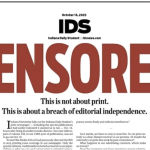Birmingham City Council
Birmingham Councilors Pan New BWWB Public Comments Policy

Donate today to help Birmingham stay informed.
Several Birmingham City Council members on Tuesday criticized the Birmingham Water Works Board’s new public comment policy as overly restrictive.
Councilor J.T. Moore said he was disheartened by the change, which requires members of the public to apply and be approved by the board to be heard.
“We sit on the City Council here and good, bad, ugly, indifferent, we don’t stop the public from being able to say what they need to say to us,” he said. “We don’t try to police them in that way because every citizen has the right to come up and share what it is that they feel in their heart needs to be shared. Whether we agree with it or not, that’s neither here nor there. They have that right. I would hope that BWWB would do the same and have that same mentality and know that people have the freedom to speak and they should be allowed to do that even if you don’t agree with it.”
The board approved the new policy on April 9. In addition to reducing the time allotted to a speaker from three minutes to two, the new procedure lists a dozen criteria a potential comment must meet before being approved.
It also requires members of the public who want to speak during board meetings to register within 24 hours of the agenda being posted.
The policy also bars any discussion of litigation or topics “that may lead to litigation.”
Councilor Wardine Alexander agreed with Moore, saying the new requirements were too much.
“I’m just asking the board that they would reconsider and make that process a little more open,” she said.
The changes come after a former water works board member, William Muhammad, was escorted from a February board meeting while making a comment about the rehiring of former General Manager Mac Underwood.
Board Chairwoman Tereshia Huffman motioned for the new policy and Vice Chairman William Burbage seconded it.
The Water Works Board also approved a new policy for records requests. The new procedure requires that residents requesting records pay for those documents up front. Records cost $1 per page, whether a physical print or electronic copy. That’s in addition to paying the costs associated with the staff labor required to fulfill the request. A deposit will be required, and payment must be made with a cashier’s check or money order. Board staff will not accept credit or debit cards. Alabama law allows government entities to charge reasonable fees for such requests, including the staff costs associated with producing the documents.
The board’s request form also requires a resident who asks to see records to provide their name, phone number, email address, street address, citizenship status and driver’s license information. Alabama law requires only that a requester be a resident of the state.
The board oversees the largest water utility in Alabama, serving more than 770,000 customers across five counties.


